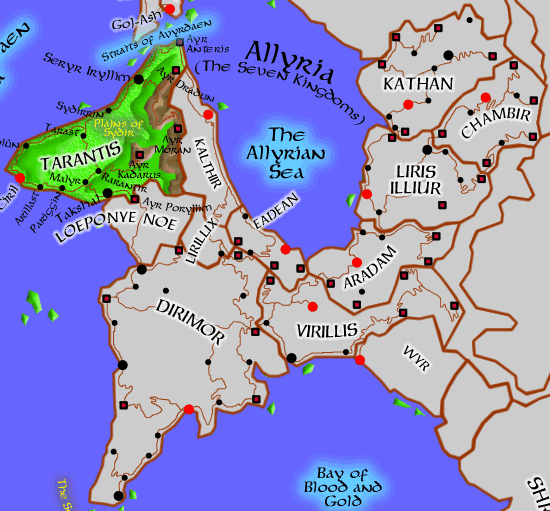Old Empire, Kingdom of Thorns
The Kingdom of Tarántis forms the northernmost point of the Illyri Peninsula. It is bordered to the south by the Ōéle kingdom of Lōépōnye Nōe, and the Illyri Duchy of Kalðir. During the Late Dekàli Empire, Tarántis was part of the Viríllis city-state. During the Andùl Illyri Empire, Tarántis and Kantris were one kingdom, known as Antæ̀ris.Government
- Type – Illyri Monarchy
- Ruler –
- Capital – City of Ciril
- Cities – Ciril, Takshal, Seryr Iryllim
- Calendar –
- Festivals –
People
- Races – Yrūn 86%, Ōéle 9%, Dwürden 2%, Gnor 1%, other 2%
- Ethnicities –
- Languages – Tara-Antir (i.e., Tarántic), Acèntyric, Trade
- Religions –
Trade
- Currency –
- Imports –
- Exports –
Regions, Geographic
- Plains of Sydir. A broken rocky land that stretches between the Sydirnyn seat and the mount of Ayr Kadarus. The soil is not deep, so the region is lush with tall grasses between outcropping stones. Farming the plains is impossible. The area has long been ill-regarded as a sanctuary for bandits and hermits. Historically, the Plains of Sydir have been used on more than one occasion to mask the movement of troops across the Tarantis midlands resulting in a number of battles among the stones.
Regions, Political
Cities, Towns, and Villages
- City of Ciril
- City of Seryr Iryllim
- City of Takshal
- Town of Aríllast
- Town of Kolûn
- Town of Malyr
- Town of Paríggin
- Town of Raràntir
- Town of Sydìrrin
- Town of Tarast
Landmarks
- Ayr Anterís
- Ayr Dràdūn
- Ayr Kàdarús
- Ayr Mòran
- Ayr Pòryllìm
- Finger of Tarnàzhyin
People
History
Battle of Ciril
In 734 HK, the Illyri Campaign made landfall near the Town of Kolûn, north of the capital. Tarántis had been expecting an assault from Dekàli forces camped at Rallàūn for two years, but had reduced their troop numbers after a long and quiet period. The Dekàli general, Salāys of Anðris, unloaded thirty ships of men and horses on the coast of Tarántis and marched unimpeded into Kolûn. Cavalry policed the countryside, rounding up families and militiamen fleeing toward Ciril. At Ayr Kolûn, the local lord was dragged from his keep and inverted between two trees. Unwilling to profess allegiance to the High Queen, the lord was slowly sawed in half from groin to chest until he died. In the following days, more ships arrived from Rallàūn. When the armies were ready, Salāys marched south toward the City of Ciril while his ships circled west to form a blockade against supplies and reinforcements. The Battle of Ciril was engaged in the late Spring of 734 HK, amid a landscape of burning fields and smoking villages. Trebuchets hammered at the city walls while magicians summoned fiery rains upon the panicked inhabitants. A second army that had taken an inland path met resistance from the Army of Aríllast, that was seeking to flank the main Dekàli force from the east. The walled City of Ciril was protected by three keeps, each manned by a force of regulars and militia. Forces from these keeps sallied outward to engage the Dekàlyr repeatedly, requiring the enemy to protect from every side, but always retreating to the safety of their walls. It became obvious to Salāys that this was not a winning strategy for the Tarántyr and that the city was buying time for reinforcements to arrive. In a hostile land without a reliable chain of supplies, he could not maintain an indefinite siege. Salāys instructed his forces to press on Ciril, even if the capital was leveled in the process. Over the next two days, the city was reduced to burning embers. The King of Tarántis walked through the city gate a broken man. His family had attempted to flee by ship but the vessel was sunk by the Dekàli blockade. General Salāys accepted the king’s surrender, had him shaved, stripped, tattooed, and chained in a slave galley.
The Battle of Ciril was not the final conflict for Tarántis. Many cities and towns refused to lay down their arms to the invaders. Resistance in Tarántis was not quelled for another two years. General Salāys was poisoned in the Summer of 734 HK, but did not die. Partially paralyzed, he commanded the Dekàli armies at the First Battle of Diràni from a chair, attended by nurses. Following the loss at Diràni, the High Queen relieved him of command.
Time Line
Dynasties
Post-Dekàlas
- First Taráni House of Dirsðan ( – present)
Nomenclature: Tarantis Dekàlic: Tarántis (place), Taránti (pertaining to), Tarántyn (resident), Tarántyr (people), Tarántic (language)
